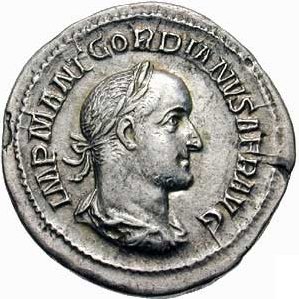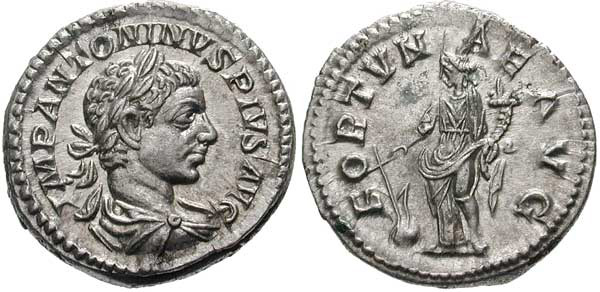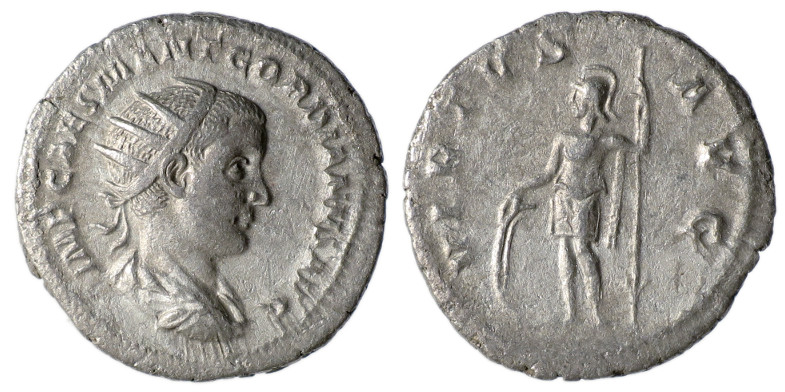|
Gordian II
Gordian II ( la, Marcus Antonius Gordianus Sempronianus Romanus; 192 – April 238) was Roman emperor with his father Gordian I in 238 AD, the Year of the Six Emperors. Seeking to overthrow Maximinus Thrax, he died in battle outside Carthage. Since he died before his father, Gordian II had the shortest reign of any Roman emperor, at 22 days. Early life Born 192, Gordian II was the only known son of Gordian I, who was said to be related to prominent senators. His praenomen and nomen ''Marcus Antonius'' suggest that his paternal ancestors received Roman citizenship under the triumvir Mark Antony, or one of his daughters, during the late Roman Republic. Gordian's cognomen "Gordianus" suggests that his family origins were from Anatolia, especially Galatia and Cappadocia. According to the notoriously unreliable ''Historia Augusta'', his mother was a Roman woman called Fabia Orestilla, born circa 165, who the ''Historia'' claims was a descendant of emperors Antoninus Pius and ... [...More Info...] [...Related Items...] OR: [Wikipedia] [Google] [Baidu] |
Denarius
The denarius (, dēnāriī ) was the standard Roman silver coin from its introduction in the Second Punic War to the reign of Gordian III (AD 238–244), when it was gradually replaced by the antoninianus. It continued to be minted in very small quantities, likely for ceremonial purposes, until and through the Tetrarchy (293–313). The word ''dēnārius'' is derived from the Latin ''dēnī'' "containing ten", as its value was originally of 10 assēs.Its value was increased to 16 assēs in the middle of the 2nd century BC. The word for "money" descends from it in Italian (''denaro''), Slovene (''denar''), Portuguese (''dinheiro''), and Spanish (''dinero''). Its name also survives in the dinar currency. Its symbol is represented in Unicode as 𐆖 (U+10196), a numeral monogram that appeared on the obverse in the Republican period, denoting the 10 asses ("X") to 1 denarius ("I") conversion rate. However it can also be represented as X̶ (capital letter X with combining lo ... [...More Info...] [...Related Items...] OR: [Wikipedia] [Google] [Baidu] |
Anatolia
Anatolia, tr, Anadolu Yarımadası), and the Anatolian plateau, also known as Asia Minor, is a large peninsula in Western Asia and the westernmost protrusion of the Asian continent. It constitutes the major part of modern-day Turkey. The region is bounded by the Turkish Straits to the northwest, the Black Sea to the north, the Armenian Highlands to the east, the Mediterranean Sea to the south, and the Aegean Sea to the west. The Sea of Marmara forms a connection between the Black and Aegean seas through the Bosporus and Dardanelles straits and separates Anatolia from Thrace on the Balkan peninsula of Southeast Europe. The eastern border of Anatolia has been held to be a line between the Gulf of Alexandretta and the Black Sea, bounded by the Armenian Highlands to the east and Mesopotamia to the southeast. By this definition Anatolia comprises approximately the western two-thirds of the Asian part of Turkey. Today, Anatolia is sometimes considered to be synonymous w ... [...More Info...] [...Related Items...] OR: [Wikipedia] [Google] [Baidu] |
Severus Alexander
Marcus Aurelius Severus Alexander (1 October 208 – 21/22 March 235) was a Roman emperor, who reigned from 222 until 235. He was the last emperor from the Severan dynasty. He succeeded his slain cousin Elagabalus in 222. Alexander himself was eventually assassinated, and his death marked the beginning of the events of the Crisis of the Third Century, which included nearly fifty years of civil war, foreign invasion, and the collapse of the monetary economy. Alexander was the heir to his cousin, the 18-year-old Emperor Elagabalus. The latter had been murdered along with his mother Julia Soaemias by his own guards, who, as a mark of contempt, had their remains cast into the Tiber river. Alexander and his cousin were both grandsons of Julia Maesa, the sister of empress Julia Domna, who had arranged for Elagabalus's acclamation as emperor by the Third Gallic Legion. Alexander's 13-year reign was the longest reign of a sole emperor since Antoninus Pius. He was also the second-young ... [...More Info...] [...Related Items...] OR: [Wikipedia] [Google] [Baidu] |
Consul
Consul (abbrev. ''cos.''; Latin plural ''consules'') was the title of one of the two chief magistrates of the Roman Republic, and subsequently also an important title under the Roman Empire. The title was used in other European city-states through antiquity and the Middle Ages, in particular in the Republics of Genoa and Pisa, then revived in modern states, notably in the First French Republic. The related adjective is consular, from the Latin ''consularis''. This usage contrasts with modern terminology, where a consul is a type of diplomat. Roman consul A consul held the highest elected political office of the Roman Republic (509 to 27 BC), and ancient Romans considered the consulship the highest level of the '' cursus honorum'' (an ascending sequence of public offices to which politicians aspired). Consuls were elected to office and held power for one year. There were always two consuls in power at any time. Other uses in antiquity Private sphere It was not uncommon fo ... [...More Info...] [...Related Items...] OR: [Wikipedia] [Google] [Baidu] |
Praetor
Praetor ( , ), also pretor, was the title granted by the government of Ancient Rome to a man acting in one of two official capacities: (i) the commander of an army, and (ii) as an elected '' magistratus'' (magistrate), assigned to discharge various duties. The functions of the magistracy, the ''praetura'' (praetorship), are described by the adjective: the ''praetoria potestas'' (praetorian power), the ''praetorium imperium'' (praetorian authority), and the ''praetorium ius'' (praetorian law), the legal precedents established by the ''praetores'' (praetors). ''Praetorium'', as a substantive, denoted the location from which the praetor exercised his authority, either the headquarters of his '' castra'', the courthouse (tribunal) of his judiciary, or the city hall of his provincial governorship. History of the title The status of the ''praetor'' in the early republic is unclear. The traditional account from Livy claims that the praetorship was created by the Sextian-Licinian Rogat ... [...More Info...] [...Related Items...] OR: [Wikipedia] [Google] [Baidu] |
Elagabalus
Marcus Aurelius Antoninus (born Sextus Varius Avitus Bassianus, 204 – 11/12 March 222), better known by his nickname "Elagabalus" (, ), was Roman emperor from 218 to 222, while he was still a teenager. His short reign was conspicuous for sex scandals and religious controversy. A close relative to the Severan dynasty, he came from a prominent Arab family in Emesa (Homs), Syria, where since his early youth he served as head priest of the sun god Elagabal. After the death of his cousin, the emperor Caracalla, Elagabalus was raised to the principate at 14 years of age in an army revolt instigated by his grandmother Julia Maesa against Caracalla's short-lived successor, Macrinus. He only posthumously became known by the Latinised name of his god. Later historians suggest Elagabalus showed a disregard for Roman religious traditions and sexual taboos. He replaced the traditional head of the Roman pantheon, Jupiter, with the deity Elagabal, of whom he had been high priest. H ... [...More Info...] [...Related Items...] OR: [Wikipedia] [Google] [Baidu] |
Quaestor
A ( , , ; "investigator") was a public official in Ancient Rome. There were various types of quaestors, with the title used to describe greatly different offices at different times. In the Roman Republic, quaestors were elected officials who supervised the state treasury and conducted audits. When assigned to provincial governors, the duties were mainly administrative and logistical, but also could expand to encompass military leadership and command. It was the lowest ranking position in the ' (course of offices); by the first century BC, one had to have been quaestor to be eligible for any other posts. In the Roman Empire, the position initially remained as assistants to the magistrates with financial duties in the provinces, but over time, it faded away in the face of the expanding imperial bureaucracy. A position with a similar name (the ') emerged during the Constantinian period with judicial responsibilities. Etymology ''Quaestor'' derives from the Latin verb ', ... [...More Info...] [...Related Items...] OR: [Wikipedia] [Google] [Baidu] |
Gordian III
Gordian III ( la, Marcus Antonius Gordianus; 20 January 225 – February 244) was Roman emperor from 238 to 244. At the age of 13, he became the youngest sole emperor up to that point (until Valentinian II in 375). Gordian was the son of Antonia Gordiana and Junius Balbus, who died before 238. Antonia Gordiana was the daughter of Emperor Gordian I and younger sister of Emperor Gordian II. Very little is known of his early life before his acclamation. Gordian had assumed the name of his maternal grandfather in 238. Rise to power In 235, following the murder of Emperor Alexander Severus in Moguntiacum (modern Mainz), the capital of the Roman province Germania Superior, Maximinus Thrax was acclaimed emperor. In the following years, there was a growing opposition against Maximinus in the Roman Senate and amongst the majority of the population of Rome. In 238, a rebellion broke out in the Africa Province, where Gordian's grandfather and uncle, Gordian I and II, were proclaim ... [...More Info...] [...Related Items...] OR: [Wikipedia] [Google] [Baidu] |
Antonia Gordiana
Antonia Gordiana (born 201) was a prominent, wealthy and noble Roman woman who lived in the troubled and unstable 3rd century. She was the daughter of Roman Emperor Gordian I; sister to Roman Emperor Gordian II and mother to Roman Emperor Gordian III. The ''Augustan History'' names her as Maecia Faustina, however modern historians dismiss this name as false. She was most probably born in Rome. Along with her elder brother they were raised and spent their childhoods in the house that Roman Republican General Pompey had built in Rome. Previous owners included Roman Triumvir Mark Antony and Roman Emperor Tiberius. After 214, Gordiana married an unnamed Roman Senator. The ''Augustan History'' names her husband as Junius Balbus, however modern historians dismiss this name as being incorrect. She bore her husband a son, Marcus Antonius Gordianus Pius (known as Gordian III), who was born on 20 January 225. The birth name of Gordian III is unknown as is his birthplace. The name of Go ... [...More Info...] [...Related Items...] OR: [Wikipedia] [Google] [Baidu] |
Herodes Atticus
Herodes Atticus ( grc-gre, Ἡρώδης; AD 101–177) was an Athenian rhetorician, as well as a Roman senator. A great philanthropic magnate, he and his wife Appia Annia Regilla, for whose murder he was potentially responsible, commissioned many Athenian public works, several of which stand to the present day. " e of the best-known figures of the Antonine Period", he taught rhetoric to the Roman emperors Marcus Aurelius and Lucius Verus, and was advanced to the consulship in 143. His full name as a Roman citizen was Lucius Vibullius Hipparchus Tiberius Claudius Atticus Herodes. According to Philostratus, Herodes Atticus, in possession of the best education that money can buy, was a notable proponent of the Second Sophistic. Having gone through the '' cursus honorum ''of civil posts, he demonstrated a talent for civil engineering, especially the design and construction of water-supply systems. The Nymphaeum at Olympia was one of his dearest projects. However, he neve ... [...More Info...] [...Related Items...] OR: [Wikipedia] [Google] [Baidu] |
Marcus Aurelius
Marcus Aurelius Antoninus (Latin: áːɾkus̠ auɾέːli.us̠ antɔ́ːni.us̠ English: ; 26 April 121 – 17 March 180) was Roman emperor from 161 to 180 AD and a Stoic philosopher. He was the last of the rulers known as the Five Good Emperors (a term coined some 13 centuries later by Niccolò Machiavelli), and the last emperor of the Pax Romana, an age of relative peace and stability for the Roman Empire lasting from 27 BC to 180 AD. He served as Roman consul in 140, 145, and 161. Marcus Aurelius was born during the reign of Hadrian to the emperor's nephew, the praetor Marcus Annius Verus, and the heiress Domitia Calvilla. His father died when he was three, and his mother and grandfather raised him. After Hadrian's adoptive son, Aelius Caesar, died in 138, the emperor adopted Marcus's uncle Antoninus Pius as his new heir. In turn, Antoninus adopted Marcus and Lucius, the son of Aelius. Hadrian died that year, and Antoninus became emperor. Now heir to the throne, ... [...More Info...] [...Related Items...] OR: [Wikipedia] [Google] [Baidu] |
Antoninus Pius
Antoninus Pius ( Latin: ''Titus Aelius Hadrianus Antoninus Pius''; 19 September 86 – 7 March 161) was Roman emperor from 138 to 161. He was the fourth of the Five Good Emperors from the Nerva–Antonine dynasty. Born into a senatorial family, Antoninus held various offices during the reign of Emperor Hadrian. He married Hadrian's niece Faustina, and Hadrian adopted him as his son and successor shortly before his death. Antoninus acquired the cognomen Pius after his accession to the throne, either because he compelled the Senate to deify his adoptive father, or because he had saved senators sentenced to death by Hadrian in his later years. His reign is notable for the peaceful state of the Empire, with no major revolts or military incursions during this time. A successful military campaign in southern Scotland early in his reign resulted in the construction of the Antonine Wall. Antoninus was an effective administrator, leaving his successors a large surplus in th ... [...More Info...] [...Related Items...] OR: [Wikipedia] [Google] [Baidu] |






.jpg)



